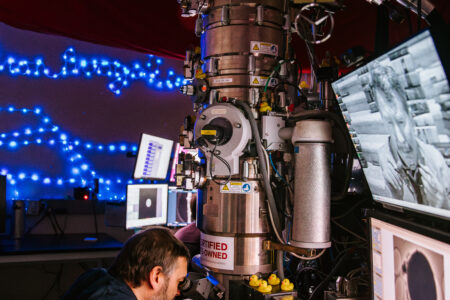
Industrial engineers play a key role in driving change. In a world where everyone wants things faster, cheaper, and safer, skills developed in areas like chain management, organisational transformation, and systems optimisation are increasingly valuable. It’s this shift that’s making industrial engineers with advanced knowledge and skills highly sought after throughout a wide range of sectors. As employment of industrial engineers is projected to increase by 12% come 2032, now is the perfect time to prepare to rise and lead this dynamic field.
A graduate degree will be crucial. What you will get from it are in-depth theories and more sophisticated applied practical experience, both of which are advantageous for climbing the corporate ladder into senior or managerial positions. These top positions may earn you an annual median of US$99,380, according to the US Bureau of Labour Statistics.
To improve your chances further, select a graduate degree from these top-ranked US universities:

In the Department of Industrial Engineering, you will learn using quantitative modelling. Source: University of Arkansas
University of Arkansas
Choosing to pursue a graduate degree at the University of Arkansas means choosing to be part of an institution ranked #31 in the 2023 rankings of Best Industrial Engineering Programmes in the US (US News & World Report). It is here where you get to dive into meaningful research that tackles real-world problems. In the Department of Industrial Engineering, graduate students learn from experts in transportation, reliability engineering, and management. Not only will you learn mathematical and statistical theories regarding the subject, but you will also apply them practically, setting you up to meet the demands of careers in industry and academia.
Here, doctoral candidates combine rigorous academic study with independent investigation that results in original scholarly work of the highest quality. Master’s students explore specific areas in industrial and systems engineering, as well as general master’s study. You can choose from a thesis, non-thesis or project track as well as select a plan that leads to a PhD.
Whichever programme you choose, you’ll benefit from the UoA edge. There are meaningful research opportunities to tackle real-world industry challenges, endeavours that set you up for roles in Northwest Arkansas’s Fortune 500 companies. Fellowships let you maximise various financial aid options while student organisations provide more support from a community of like-minded scholars through societies, clubs and alumni groups, as well as career-focused activities. Step beyond campus and you’re in Fayetteville, where outdoor activities, Razorback sports, the stunning Crystal Bridges Museum and more await. Apply to the Department of Industrial Engineering at the University of Arkansas today.

The master’s degree concentrations are updated to reflect recent directional advances in the field. Source: New York University
New York University
Ranked among the top 40 best engineering schools in the US, the New York University (NYU) Tandon School of Engineering offers an on-campus Master of Sciences (MSc) in Industrial Engineering that prepares you for leadership roles. Classes combine a mix of theories and real-world applications — all of which are taught by professors with significant industry experience.
The MSc comprises 12 courses with three areas of concentrations that are updated to reflect recent advances in the field. They include Business Transformation and Continuous Improvement, Operations and Supply Chain Management, and Operations Research and Systems Analytics. Depending on which specialisation you choose, you will gain knowledge and skills in either consulting, management, and data science, or operations analysis.
Located at the heart of Brooklyn Tech Triangle (a tech hub connecting Dumbo, Downtown Brooklyn, and Navy Yard), the school is a great location to surround yourself with industry experts. Since it is close to Manhattan, you are close to many companies across diverse sectors — and especially in industrial engineering. This strategic location also creates opportunities for internships and job placements.

The degrees here are a foundation that ensures graduates have the advanced knowledge and skills to thrive in various settings. Source: University of California, Berkeley
University of California, Berkeley
UC Berkeley is known for offering interdisciplinary, hands-on and impactful education. Nowhere is this more true than in its Industrial Engineering and Operations Research (IEOR) Department. Its graduate programmes are aimed at helping students develop expertise in various fields, including artificial intelligence, healthcare technology, energy systems, finance, data science, and more.
There are several to choose from, including the Master of Analytics, Master of Engineering, Master of Science, and PhD. Each route is rigorous, a foundation that ensures graduates have the advanced knowledge and skills to thrive in various settings.
Take the Master of Engineering programme in Industrial Engineering & Operations Research, for example. It is a one-year, full-time programme with a curriculum that fuses business-oriented coursework with practical applications in optimisation analytics, risk modelling, simulation, and data analysis. New topics like machine learning and data science further enhance the programme, equipping you with the know-how to manage complex projects and navigate financial and operational challenges.
Pair that with state-of-the-art facilities, labs and studios, and you’ll have an engaging learning experience few other universities can provide. What’s more, Berkeley’s location in the heart of the Bay Area means students can collaborate in different teams, partner with industry leaders, and gain practical experience by tackling real-world projects under the guidance of esteemed faculty and industry experts. It’s little wonder why graduates land enviable roles in Google, Apple, McKinsey, Deloitte, Ford, UPS and more.
*Some of the institutions featured in this article are commercial partners of Study International










